|
|
|
Sort Order |
|
|
|
Items / Page
|
|
|
|
|
|
|
| Srl | Item |
| 1 |
ID:
159756
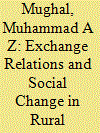

|
|
|
|
|
| Summary/Abstract |
In recent decades, the nature of exchange relations in rural Pakistan appears to have undergone significant transformations due to the gradual shift from seasonal agriculture to a market-based economy, rapid urbanisation and industrialisation. Change and continuity in exchange relations are particularly manifested in rituals and ceremonies associated with childbirth, marriage and death, with socioeconomic transformations in the rural economy triggering shifts in ways of conducting such rituals and ceremonies. This article seeks to highlight such change but argues that the continuing centrality of religion, kinship and economic inter-dependencies, marked by rural social organisation, remains evident in how these rituals and ceremonies are conducted. After discussing the social meanings of such rituals and ceremonies in rural Pakistan, the article demonstrates through detailed ethnographic study certain modifications in exchange relations as a consequence of recent socioeconomic change.
|
|
|
|
|
|
|
|
|
|
|
|
|
|
|
|
| 2 |
ID:
066635
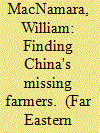

|
|
|
| 3 |
ID:
176915
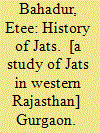

|
|
|
|
|
| Publication |
Gurgaon, Shubhi Publications, 2011.
|
| Description |
219p.hbk
|
| Standard Number |
9788182902350
|
|
|
|
|
|
|
|
|
|
|
|
Copies: C:1/I:0,R:0,Q:0
Circulation
| Accession# | Call# | Current Location | Status | Policy | Location |
| 059964 | 954.40544/BAH 059964 | Main | On Shelf | General | |
|
|
|
|
| 4 |
ID:
087723
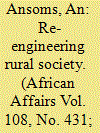

|
|
|
|
|
| Publication |
2009.
|
| Summary/Abstract |
This article analyses the Rwandan elite's visions and ambitions for a wide-ranging re-engineering of rural society. The post-1994 political elite has few links to rural society and the peasant way of life, and sees little room for small-scale peasant agriculture in Rwanda's economic future. The article shows how current Rwandan policy makers aim to realize three social engineering ambitions: first, to transform the agricultural sector into a professionalized motor for economic growth, centred on competitive and commercial farm units; second, to artificially upgrade rural life by inserting 'modern' techniques and strategies into local realities, while hiding true poverty and inequality; and, finally, to transform Rwanda into a target-driven society from the highest to the lowest level. The article points to the (potential) dangers, flaws, and shortcomings of this rural re-engineering mission, and illustrates how the state as the engineer 'hovers' above the local without consulting those affected. It concludes that contemporary polices are unlikely to be conducive to poverty reduction.
|
|
|
|
|
|
|
|
|
|
|
|
|
|
|
|
| 5 |
ID:
126473
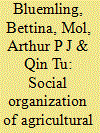

|
|
|
|
|
| Publication |
2013.
|
| Summary/Abstract |
While for wind, solar energy or hydropower, energy supply happens directly from the source to the wind wheels, hydropower turbines or solar panels, in the case of biogas, energy production cannot directly take from the energy source, organic matter, but depends on the institutional structures and farmers' practices involved for making energy available. With the production of bioenergy in rural areas, practices within agriculture are transformed, requiring new ways of organizing production processes. Research has left the question largely unanswered of how agricultural biogas production and use are - and can best be - organized within rural society. Which kinds of social organization exist, how are these embedded in existing agricultural institutions and practices, and how do these systems function? Under which conditions may the different kinds of social organization of biogas production and use work sustainably? This introduction article to the Special Issue "The social organization of agricultural biogas production and use" presents a framework for analysing the different kinds of social organization of biogas production and use presented hereafter. Analysis parameters are the supply network, distribution network, distribution of benefits, social boundaries of the system (accessibility) and scale. Using these parameters, the Special Issue articles are outlined.
|
|
|
|
|
|
|
|
|
|
|
|
|
|
|
|
| 6 |
ID:
154157
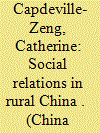

|
|
|
|
|
| Summary/Abstract |
The Wu Boliang affair reported in the Chinese media several years ago is symptomatic of the complex socio-political situation in the Chinese countryside. Wu Boliang was one of the first entrepreneurs from his village to develop the cultivation of mandarin oranges, and in 1993 and 1997 he acquired several orchards under the “responsibility system” in order to make them productive with the help of the township. But the latter did not provide him with the necessary funds in time, obliging him to borrow in his own name to cover the wages of the agricultural workers and the purchase of pesticides, fertiliser, etc. As the years went by and debts piled up, the township still did not reimburse him, forcing Wu Boliang to undertake legal proceedings. Although he immediately won his case against the township, the sums owed to him were still not paid, and he had no other option but to become a petitioner. In 2014, 20 years after the signing of the contract, the matter was finally settled. My in-depth analysis follows this particular case over a period of about ten years, and gives a detailed insight into the intricate interplay between the various mechanisms within the hierarchical pyramid of the Chinese society. This enables me to study the behaviour of the agents – both individuals and institutions.
|
|
|
|
|
|
|
|
|
|
|
|
|
|
|
|
|
|
|
|
|